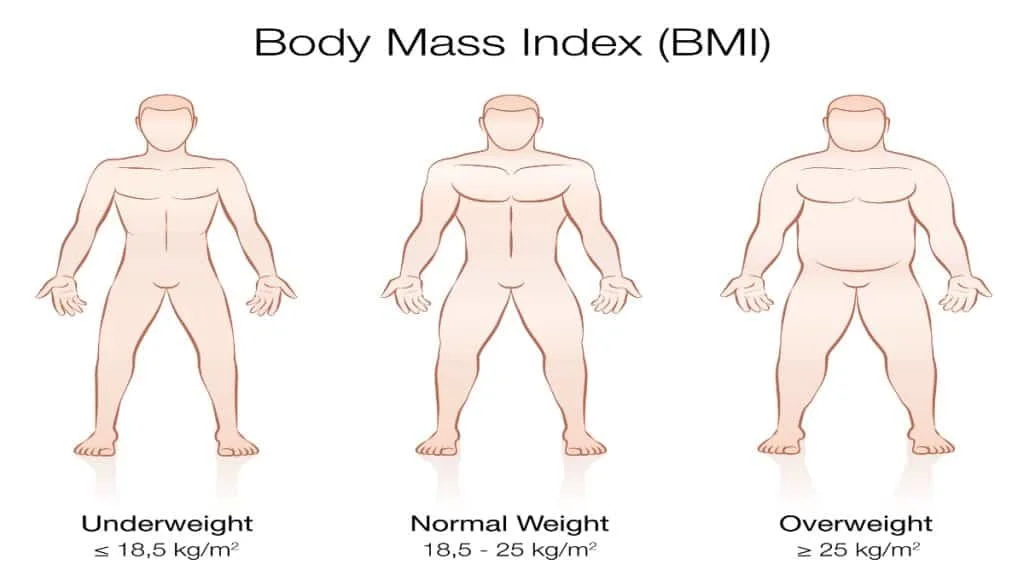A BMI of 25 is on the very low end of the overweight category for men and women. So what does this mean for your health?
While many people with a body mass index of 25 could likely benefit from losing weight, having an overweight BMI—especially on the low end of the classification—isn’t necessarily a detriment to your health.
Compare More BMIs:
- Average BMI
- BMI of 19
- BMI of 20
- BMI of 21
- BMI of 22
- BMI of 23
- BMI of 24
- BMI of 26
- BMI of 27
- BMI of 28
- BMI of 29
Is a BMI of 25 good for a female?

Is a BMI of 25 good for a female? A BMI of 25 is considered overweight for a woman, and as such, it is generally recommended that females with a 25 BMI score lower their weight.
Yet, you could actually argue that a BMI of 25 is good for women because it’s nearly five BMI points lower than average.
Of course, considering that the average American is far too heavy, you’re not necessarily healthy just because you’re slimmer than average.
While obesity is an undeniable and growing problem, you can’t use BMI to measure body fatness or muscularity, meaning that you simply cannot determine your health status with a body mass index score.
Is a 25 BMI good for a male?

Is a 25 BMI good for a male? A BMI of 25 is slightly overweight for a male, but not by much. A body mass index of 25 is actually 4.5 BMI points lower than average for a man.
Many men have a 25 BMI score, and yet, they look very different. How could this be?
Well, it’s possible to have a BMI of 25 while being lean and muscular, such as if you’re an athlete or a weight lifter.
Similarly, you can have a very unhealthy body while also having a BMI of 25 (low levels of muscle mass and a large amount of body fat).
Ultimately, while BMI is a useful indicator of overall body size in relation to your height, it can’t be used to measure your body composition, which plays a key role in determining your health status.
What does a person with a BMI of 25 look like?

Given that body mass index is a mere screening tool that can’t measure body composition, it’s not possible to say what a 25 BMI actually looks like.
Still, since men usually have more muscle than women, we can confidently say that a man with a 25 BMI score will be leaner and more muscular than a woman with a BMI of 25.
Similarly, at a body mass index of twenty-five, gym-goers will have a more favorable physique (more muscle, less fat) than sedentary individuals.
Of course, many people with a body mass index of 25 are neither really lean nor really fat; they fall somewhere in the middle.
Common BMI 25 readings and scores

When you input your weight and height into a body mass index calculator, you’ll likely get a reading like these unless your BMI is right on 25 or a similar whole value.
25.1 BMI
A 25.1 BMI is considered overweight, but not by a whole lot. At this size, an individual can be muscular and lean, or they can be skinny-fat, which is called sarcopenic obesity.
25.2 BMI
A BMI of 25.2 is in the overweight category for both males and females. Whether or not this is a bad thing for you depends on your body composition. All else being equal, at a 25.2 BMI, it’s better to be leaner than to be fatter.
25.3 BMI
If you have a 25.3 BMI, then you’re only just in the overweight category. At this body size, it’s unlikely that you have a huge frame (an average build is more likely), although you might still be more muscular than average.
25.4 BMI
If you’ve got a BMI of 25.4, then you might be carrying too much body fat. On the other hand, you could also have a lot of muscle mass. Taking skinfold measurements is a better way to determine your body composition.
25.5 BMI
Those who have a BMI of 25.5 are considered overweight, but only by half a BMI point. It’s not possible to say if a 25.5 BMI is good or bad because body mass index doesn’t distinguish between muscle and fat.
25.6 BMI
A BMI of 25.6, while lower than average for men and women, is still considered slightly overweight. Again, whether this is okay depends on your ratio of muscle mass to fat tissue.
25.7 BMI
If you have a BMI of 25.7, then you’re likely not extremely fat. Indeed, many people with a 25.7 BMI have a balanced mixture of muscle and fat, resulting in an average-to-fit body shape.
25.8 BMI
A 25.8 BMI falls into the overweight category for the body mass index but is still on the lower end of the overweight classification.
25.9 BMI
If you have a BMI of 25.9, then your body mass index score is one full BMI point into the overweight category. Of course, this could be due to your muscle mass, body fat, bone structure, or a combination of all three.
Conclusion: Is it normal to have a body mass index of 25?
Although it’s not that high, having a BMI of 25 is actually not normal, at least not for Americans at the time of writing.
You see, most people have a body mass index that’s 4-5 BMI points higher than 25, meaning that most adults don’t have a 25 BMI score.
A body mass index of 25 is more common among teenagers, and some adults certainly do have a BMI of 25. Still, even though it’s technically in the overweight category (only just), a 25 BMI is still way lower than average.
References
- Marcellini, F., Giuli, C., Papa, R., Tirabassi, G., Faloia, E., Boscaro, M., Polito, A., Ciarapica, D., Zaccaria, M., & Mocchegiani, E. (2009). Obesity and body mass index (BMI) in relation to life-style and psycho-social aspects. Archives of gerontology and geriatrics, 49 Suppl 1, 195–206. https://doi.org/10.1016/j.archger.2009.09.029
- Kok, P., Seidell, J. C., & Meinders, A. E. (2004). De waarde en de beperkingen van de ‘body mass index’ (BMI) voor het bepalen van het gezondheidsrisico van overgewicht en obesitas [The value and limitations of the body mass index (BMI) in the assessment of the health risks of overweight and obesity]. Nederlands tijdschrift voor geneeskunde, 148(48), 2379–2382.

